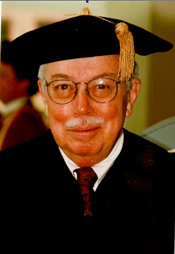T. Alexander Pond, Former Executive Vice President and Acting President of Rutgers University, Dies at 85
Under the leadership of President Edward J. Bloustein and Pond, the university achieved recognition as an outstanding public research institution
T. Alexander Pond, a visionary leader and physicist who is credited with helping raise the profile of Rutgers from a good regional university to a world-class research institution, died early Sunday at his home in Vermont.

T. Alexander Pond
Pond, who had been executive vice president of the State University of New York at Stony Brook and chair of its Physics Department, was appointed executive vice president and chief academic officer by then Rutgers President Edward J. Bloustein in 1982. During the period between Bloustein's death in 1989 and the appointment of Francis L. Lawrence as Rutgers 19th president in 1990, Pond served as Rutgers acting president.
Under the leadership of Bloustein and Pond, Rutgers reached new heights. The two worked together to raise the university’s stature, fostering a close relationship with state and federal officials, expanding research facilities, establishing new technology centers, and attracting internationally renowned scholars. In February 1989, the university was invited to join the 56 other prestigious academic institutions that then made up the Association of American Universities.
“Alec Pond was a truly great academic leader for Rutgers,” said Rutgers University President Richard L. McCormick. “Because of Alec, the university appointed and supported outstanding faculty who elevated the stature and research profile of Rutgers and established nationally distinguished programs in many fields. Whole academic areas were created, elevated, or transformed, including marine science, biotechnology, and materials science to name a few, as well as the humanities and social sciences. These achievements led directly to Rutgers' admission to the Association of American Universities in 1989.”
Joseph Seneca, University Professor at the Edward J. Bloustein School of Planning and Public Policy, said Pond was instrumental in shaping state policy to make major improvements in science and technology programs at Rutgers and in higher education in New Jersey. Assisted by a $90 million state bond issue, Rutgers added centers for advanced food technology, ceramics research, and optic materials research, as well as building and renovation projects.
He worked with then Governor Thomas Kean and the Commission on Science and Technology in helping to determine the kind of investments the state was making in ideas, enterprise, and people and to recognize the vital role Rutgers played, and would continue to play, in technological innovation.
“As the commission evolved, Alec worked closely with its leadership and helped shape the content and direction of those policies,” Seneca said. “As a result, Rutgers benefited significantly from the additional resources which he used extraordinarily well over a sustained period to build the academic quality of its programs and faculty.”
Kenneth Breslauer, vice president for Health Science Partnerships and dean of the Division of Life Sciences in the School of Arts and Sciences, said Pond was as proud of building academic excellence in the humanities and social sciences as he was of his advancements in the scientific arenas.
“Alec Pond will be remembered as a consummate builder of academic excellence across all disciplines,” Breslauer said. “At Stony Brook, he built its physics department into a nationally recognized program. At Rutgers, he transformed an entire university into a world-class research institution. His name is forever linked with Rutgers' ascension to national and international prominence in research and scholarship.”
Pond was appointed University Professor in Rutgers’ Physics Department. He retired from Rutgers in 1997.
Pond earned his undergraduate and doctoral degrees from Princeton University. He spent nine years as a faculty member at Washington University in St. Louis. He joined SUNY Stony Brook in 1962 as chair of the physics department until 1968 and served in a number of leadership positions at Stony Brook, including executive vice president and acting president, before coming to Rutgers.
In 2004, Pond was predeceased by his wife, Barbara, herself a dedicated supporter of graduate student communities at her husband’s universities. He is survived by two children, four grandchildren, two great-grandchildren, three nephews, a niece, and an extended family of students and colleagues around the world.
"My father was always proud that the first college football game featured Rutgers and Princeton, two institutions with which he shared a more-than-sympathetic association," said his son, Ward Pond.